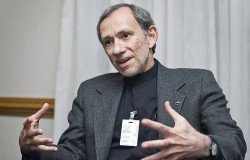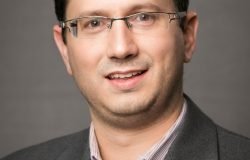Aristides A.N. Patrinos, Ph.D., was until recently (August 2015) the Deputy Director for Research of the Center for Urban Science and Progress at New York University’s Brooklyn Polytechnic Institute (NYU-Poly); now a consultant to CUSP. He is also a Distinguished Industry Professor of Mechanical Engineering and Chemical and Bimolecular Engineering at NYU-Poly.
Dr. Patrinos joined NYU-Poly from Synthetic Genomics Inc. (SGI), a privately held company founded in 2005 applying genomic-driven commercial solutions that address global energy and environmental challenges. At SGI he served as President and as Senior Vice President for Corporate Affairs. Prior to joining SGI, Dr. Patrinos was instrumental in advancing the scientific and policy framework underpinning key governmental energy and environmental initiatives while serving as associate director of the Office of Biological and Environmental Research in the U.S. Department of Energy’s Office of Science. He oversaw the department’s research activities in human and microbial genome research, structural biology, nuclear medicine and climate change. Dr. Patrinos played a historic role in the Human Genome Project, the founding of the DOE Joint Genome Institute and the design and launch of the DOE’s Genomes to Life Program, a research program dedicated to developing technologies to use microbes for innovative solutions to energy and environmental challenges.
Can you please describe the main concept behind the creation of artificial life in the lab and the ethical challenges of this scientific accomplishment?
We had been tweaking DNA since the sixties and seventies but generally with what would be considered “blunt” instruments and methods. Yes, we did make recombinant DNA and we did alter microbial functions to produce new material substances.
However, all microbes are mostly programmed by their original DNA and even though we did coerce them to do our bidding there was always a limit to how far the coercing would go. Synthesizing a microbe de novo would make it a lot easier because that creature would have as priority only what we would have programmed into it. The plan is to start with what would be a “minimal genome” containing the bare minimum of genes required to guarantee life and then add cassettes of genes for the functions we wish to impart on it. So, we go from a blunt instrument to a fine surgical one.
As long as we’re working with microbes I wouldn’t think there would be significant ethical challenges. There may be ecological/environmental ones as there have always been such challenges since the early days of recombinant DNA and we’ve been successfully dealing with those for forty years.
Of course, the moment we start thinking about synthetic multicellular and eukaryotic creatures I can see those ethical challenges growing many-fold.
You have successfully transitioned to the private sector as the President of Synthetic Genomics and then back to Academia as a Deputy Director at the NYU. Do you have advice for junior scientists who are interested in making similar career transitions?
I have always been somewhat of a scientific mongrel or a scientific journeyman. I’ve enjoyed tasting and delving into different sciences and problems not just because I get bored if I stay in any one of them for too long but also because I believe the most exciting scientific discoveries happen at the interfaces between scientific disciplines. This is not to disparage disciplinary scientists who commit their entire careers to a specific field. In fact, they are the ones who enable the overall advancement of science. In many ways they are also the ones who make it possible for dilettantes like myself to indulge in what we enjoy doing.
I’ve also bounced between research and research management (administration, policy, and selling). My advice to junior scientists who may want to go into the latter is to not attempt it before devoting 10-15 years in the former. Otherwise, you would not have the necessary credibility to function effectively.
Could you tell us how you view the current activities of the Hellenic Bioscientific Association in the USA and what opportunities exist for new initiatives?
I admire what the HBA-USA is trying to do and I wish Greece was in better shape to pay attention to such organizations.
Interview by Elisavet Serti



